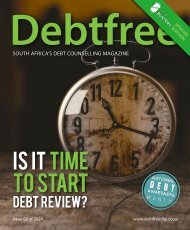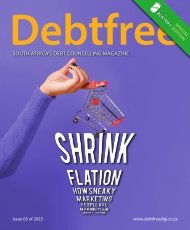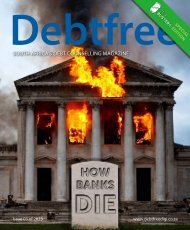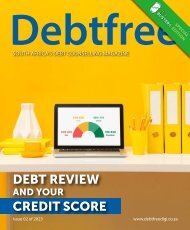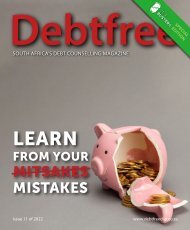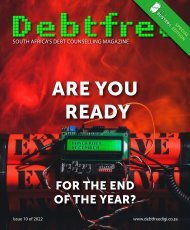Create successful ePaper yourself
Turn your PDF publications into a flip-book with our unique Google optimized e-Paper software.
SPECIAL<br />
EDITION<br />
DEBT REVIEW<br />
TASK TEAM LAUNCHED<br />
WHAT THAT MEANS FOR YOU<br />
<strong>Issue</strong> 06 of 2024
EXCELLENCE IS DOING<br />
ORDINARY THINGS<br />
EXTRAORDINARILY<br />
WELL<br />
– John W. Gardner
WHAT MAKES US<br />
EXCELLENT?<br />
/ Unimpaired and automated PDA systems<br />
/ Integration with top-ranked Debt Counsellor systems<br />
/ Best customer support in the country – queries are resolved within 24 hours<br />
/ Strong compliance and best-industry-practice implementation is at our centre<br />
Call Saishen Krishnan<br />
Head of Hyphen PDA | 071 884 7300<br />
Or call our friendly support centre on 011 303 0060 - Option 2<br />
or visit our website www.hyphenpda.co.za
FROM THE EDITOR<br />
Outlook can make a big difference. Two groups<br />
of people can be presented with the same set of<br />
circumstances and yet feel totally different. This is<br />
often true of those entering debt review.<br />
Some who are in debt review complain they cannot get access to<br />
more debt. Others are actually grateful they can’t get deeper into<br />
trouble. They are tired of sinking deeper and deeper into debt.<br />
Both face the same restrictions or circumstances and yet have<br />
different outlooks.<br />
I recently got to attend an industry event with lots of Debt<br />
Counsellors. At first, it seemed similar to many other such events<br />
but after a little while I began to notice something different.<br />
It was hard to put my finger on at first and only by lunch time<br />
had I figured out what was so different. Everyone seemed very<br />
optimistic and upbeat.<br />
Now, that is not to say that Debt Counsellors are dour people.<br />
No, such meetings are often fun but the tone can tend towards<br />
looking at problems and being somewhat frustrated about one<br />
issue or another. With this event and the bubble of conversation<br />
going on it was clear that something had shifted. For most it was<br />
the mention of Task Team 2.0.
For those who do not know what that is, this issue of the<br />
magazine has a bit of a look back at the 2009 NCR Task Team<br />
about debt review and a new Task Team that has been launched<br />
to tackle some industry challenges. Now the Task Team has not<br />
yet accomplished anything as yet but still, the prospect of some<br />
quick wins on industry matters seemed to have lifted people’s<br />
spirits. They just seemed to have a more positive outlook.<br />
Then a few days after the event I spoke to someone I have<br />
worked with for many years and he seemed more pessimistic<br />
than ever (I am a bit of an optimist myself in general). He is<br />
really passionate about the industry but worries a lot about the<br />
challenges he sees.<br />
Same circumstances but different outlooks. It will be interesting<br />
to see if the new Task Team turns his frown upside down.<br />
In this issue, we do look at some things that are a bit worrying,<br />
like Eskom’s plans. We also have some good stats about debt<br />
review, news, reviews and some less good information about<br />
what seems to be a smear campaign against debt review. You<br />
may have seen in the press that not everyone is super positive<br />
about debt review right now but we consider why that may be.<br />
If you work in the industry, you may have noticed a few more<br />
requests for you to complete one of the Debt Review Awards<br />
peer reviews recently. The in-depth reviews are on the go and<br />
we want to thank everyone who is taking part. They only take a<br />
couple of extra minutes but really do help identify those who are<br />
going above and beyond.
If you have participated in the past or visited the Awards website<br />
then you will know some of the criteria that are used to evaluate<br />
different parties. We do not want these shrouded in mystery and<br />
want to make sure everyone knows how everyone is evaluated<br />
each year. We have organised a 3 part series in the magazine<br />
(over this and the next two issues) that discuss these in a bit more<br />
depth. Be sure to also visit the YouTube Channel and Awards<br />
website from time to time where you can catch some videos<br />
about the criteria as well.<br />
Debt review works and has helped hundreds of thousands of<br />
people deal with their debt successfully. Debt review is currently<br />
putting over R1.5 Billion back into credit providers pockets each<br />
month. Amazing!<br />
Credit providers have a shocking serious drop off rate of around<br />
37.6% in their business right now. That’s people who have taken<br />
credit but end up 3 months behind on payments (the rate for those<br />
missing one payment is even higher). These millions of people<br />
need options. They need hope. They probably need debt review.<br />
So, if you are in the process then only YOU get to decide whether<br />
you focus on the positives or negatives of debt review. We suggest<br />
focusing on the positives, naturally. It will make you happier. But<br />
love it or hate it please do make your debt repayments this month.<br />
You will find that the light at the end of the tunnel gets brighter and<br />
brighter every time you take a step closer to being debt free.
DEBT REVIEW<br />
BASA<br />
The Banking Association of South Africa<br />
who are known as BASA represent the<br />
various banks who operate in South Africa<br />
with a banking license.<br />
The association advocates the views of its<br />
member banks on legislation and social<br />
and economic issues. There are currently 32<br />
members.
FROM THE<br />
DESK<br />
DEBT A BURDEN? WHY FREEZE<br />
OR FLEE WHEN YOU CAN FACE<br />
UP TO THE CHALLENGE AND<br />
BE FREE.<br />
DebtBusters is often asked by<br />
leading media reporters and<br />
stakeholders why more consumers<br />
don’t come forward for debt<br />
counselling. The answer stays<br />
complicated.<br />
We have a very sophisticated and large<br />
economy. South Africa also has a large formal<br />
sector and a large informal sector. The size<br />
of the informal sector which is largely cashdriven<br />
is hard to measure.
25 - 28 million adults are credit active. The National Credit Regulator’s<br />
data in quarterly publications reports that 8-10 million people are in<br />
arrears. That means that, either by choice or by circumstance, they<br />
have defaulted on one or more loans. That is a sign of financial strain.<br />
“When you add all these things in our context, the economy hasn’t<br />
meaningfully grown. Since 2017, employment figures have been flat.<br />
Employment as well as real wages haven’t kept up with inflation. After<br />
severe lockdowns, all this combined means if there are 25 million<br />
consumers that are credit active, somewhere between 8 - 12 million<br />
consumers are showing financial strain.“<br />
Psychology plays a role. Often people will choose one of three options.<br />
They will freeze, run away from the situation, or deal with the situation.<br />
Dealing with debt is difficult. All these factors play a role in helping us<br />
understand why people are not choosing to seek help in dealing with<br />
their debt by default or necessity.<br />
Consumers who do choose to address the burden of debt through<br />
debt counselling, enjoy the benefit of cash-flow increases, legal<br />
protection of their assets and the ability to have one, easy consolidated<br />
debt management plan.<br />
Over-indebted consumers who successfully complete debt counselling<br />
also have, on average, significantly higher credit scores than those who<br />
consider it, but do not proceed.<br />
Many clients who successfully complete debt review and obtain<br />
their clearance certificates, manage to secure vehicle finance within<br />
2 months and a new home loan within 5 months. For dedicated<br />
consumers, debt review can help turn around their long-term<br />
financial standing.
No more debt-stress.<br />
Let’s get it sorted.<br />
We’ll get your interest rates right down. You’ll<br />
make one consolidated payment a month. You’ll<br />
have more cash to live on. Your assets will be<br />
legally protected. Sorted.<br />
0861 365 910<br />
www.debtbusters.co.za<br />
info@debtbusters.co.za<br />
NCRDC2484
CONTENTS<br />
NCR DEBT REVIEW<br />
TASK TEAM<br />
LAUNCHED<br />
BANK EXECUTIVES<br />
SAYING BAD<br />
THINGS ABOUT<br />
DEBT REVIEW<br />
GET READY<br />
FOR A<br />
SHOCK!<br />
NEWS<br />
SERVICE<br />
DIRECTORY<br />
DISCLAIMER<br />
<strong>Debtfree</strong> Magazine considers its sources reliable and verifies as<br />
much information as possible. However, reporting inaccuracies<br />
can occur, consequently readers using this information do so<br />
at their own risk. <strong>Debtfree</strong> Magazine makes content available<br />
with the understanding that the publisher is not rendering legal<br />
services or financial advice. Although persons and companies<br />
mentioned herein are believed to be reputable, neither<br />
<strong>Debtfree</strong> Magazine nor any of its employees, sales executives<br />
or contributors accept any responsibility whatsoever for their<br />
activities. <strong>Debtfree</strong> Magazine contains material supplied to<br />
us by advertisers which does not necessarily reflect the views<br />
and opinions of the <strong>Debtfree</strong> Magazine team. No person,<br />
organization or party can copy or re-produce the content<br />
on this site and/or magazine or any part of this publication<br />
without a written consent from the editors’ panel and the<br />
author of the content, as applicable. <strong>Debtfree</strong> Magazine,<br />
authors and contributors reserve their rights with regards to<br />
copyright of their work.
NCR DEBT<br />
REVIEW<br />
TAS K<br />
TEAM<br />
LAUNCHED
NCR DEBT REVIEW TASK TEAM LAUNCHED<br />
A LITTLE HISTORY FOR<br />
CONTEXT<br />
Years ago, a special NCR task team<br />
helped get the jammed wheels of<br />
debt review turning again.<br />
The announcement of a brand new task<br />
team has many in the industry very excited.<br />
It may result in benefits for consumers, credit<br />
providers, the NCR, NCT and Debt Counsellors.<br />
When debt review started back in 2007,<br />
the only guidance people had was the<br />
wording of the National Credit Act and the<br />
regulations. While that may seem like plenty,<br />
it quickly became obvious that not everyone<br />
understood the words in the same way.<br />
That’s not uncommon for new legislation.<br />
Every court across the country is full of people<br />
fighting over various matters, using the exact<br />
same set of laws, some of which have been<br />
around for decades. The question is: who has<br />
the correct understanding? This was true in<br />
the debt review space as well.
Though lots of people signed up, not all Debt<br />
Counsellors did things the same way. Not all<br />
credit providers responded in the same way,<br />
or used the same forms. The courts all had<br />
different ideas about debt review (some still<br />
do) and it was basically chaos.<br />
As the number of consumers who signed up<br />
began to grow, many people were left with<br />
their matters unresolved. A serious problem<br />
was brewing and by 2009 everyone could<br />
see something had to be done, but what and<br />
how?<br />
The solution was for a small NCR guided task<br />
team to:<br />
(1) identify everyone involved in<br />
the process and what they were<br />
responsible for;<br />
(2) identify the various problem areas;<br />
and<br />
(3) make suggestions on how these<br />
could be worked out if everyone<br />
just played nice.<br />
The suggestions required everyone to meet in<br />
the middle, and make some concessions, but<br />
the end result was a plan to overcome most of<br />
the issues slowing things down.
NCR DEBT REVIEW TASK TEAM LAUNCHED<br />
THE CURRENT<br />
LANDSCAPE<br />
At the moment, the industry is facing many different<br />
challenges. Some are nuanced and seem small, but<br />
have a big knock on effect and others are so big no one<br />
knows what to do about it.<br />
The Economy in General<br />
There is a massive need for debt stressed consumers to get help.<br />
Millions of people across the country are skipping debt repayments<br />
every month.<br />
High interest rates and high levels of indebtedness mean consumers<br />
are not going to the shops and spending money. Businesses are<br />
starting to worry if they will make ends meet each month, the money<br />
is just not moving.<br />
Credit providers are struggling to find consumers to lend more<br />
money to, as most people cant realistically afford more debt. Young<br />
people are not getting jobs, and as a result can’t be given credit.<br />
Credit Providers need to recover their existing credit from non-paying<br />
clients and want more credit active clients. In the debt review space,<br />
there are some key issues as well.
For example, at present there are around 1.3 million people<br />
who have signed up for debt review but have not finished it.<br />
Of those, it seems only 245 000 are actively getting help from<br />
a Debt Counsellor, and paying off their debts via a PDA each<br />
month. So… how do you help the 1.1 million people to get<br />
back into regularly paying their debts?<br />
Consumers who sign up and then quickly change their<br />
mind find they are “trapped” with a debt review flag at credit<br />
bureaus, and get cut off from their usual credit cards etc.<br />
People “trapped” in debt review limbo for a number of years<br />
due to falling off the program, are being scammed by people<br />
offering ‘get out of debt review’ services or some sort of debt<br />
mediation scam. Many are losing thousands of rand to such<br />
scammers.<br />
Debt review consumers stay out of the credit market for 5<br />
years in general. Yes, they are paying off their debts but credit<br />
providers would like to see them back in the normal credit<br />
market sooner, if possible.<br />
Consumers who enter debt review often have to wait years to<br />
pay off even a small debt. This is due to the way payments are<br />
spilt up. No quick and easy wins, just a long grind for 5 years.<br />
People in debt review currently can’t get a cheaper car or<br />
cheaper house which they might actually be able to afford due<br />
to concerns over offering debt review clients new credit, and<br />
that being called ‘reckless’.
PDAs who supply services to consumers and Debt Counsellors<br />
alike have not had realistic fees for several years. In retrospect,<br />
past changes were overly harsh and cut their revenue to<br />
unsustainable levels for the services they offer. If this is not<br />
addressed soon, it will impact the 245 000 people trying to<br />
pay off their debt.<br />
The list goes on and on, and once everyone has had their input, the<br />
Task Team will have its work cut out for it. What to prioritise, what<br />
to focus on, which items have simple solutions and which are more<br />
complex and may take time?<br />
The idea currently seems to be that the Task Team will suggest the<br />
fast and easy wins, and other items may go on to be discussed in<br />
more detail over time at CIF.
NCR DEBT REVIEW TASK TEAM LAUNCHED<br />
WHAT IS THE<br />
CIF?<br />
Many think of the NCR’s Credit Industry Forum as a sort<br />
of task team by committee. It is a group organised by<br />
the Regulator who meet and discuss possible solutions<br />
and changes to the NCRs guidelines on industry topics.<br />
The members come from different parts of the industry, such as Debt<br />
Counsellor and credit provider associations. These are parties actively<br />
looking to make the process faster and easier for consumers.<br />
The CIF has tackled many issues over the years, and the NCR has put<br />
out several guidelines based on those discussions (where there was<br />
some sort of consensus).<br />
While not legally binding, these guidelines are often adopted by the<br />
majority of industry parties, and this can help overcome common<br />
problems (just like the Task Team is designed to do).<br />
There has been discussions about an annual Task Team to look for<br />
quick solutions with other matters being handled by CIF.
NCR DEBT REVIEW TASK TEAM LAUNCHED<br />
HOW WILL IT WORK<br />
AND WHEN?<br />
We are still waiting to hear more<br />
details, but the proposal for the Task<br />
Team was well received at the last big<br />
CIF meeting, and given the go ahead.<br />
In the past, the Task Team consisted of 3 or 4<br />
very experienced industry experts (so not a big<br />
committee) who were able to talk to others<br />
in their field, and drum up support for the<br />
initiatives suggested.<br />
One of the possible goals of the Task Team is<br />
to be able to present some sort of report to<br />
the NCR which might then make its way to<br />
the DTI in the months ahead. With new role<br />
players at the DTI, there is hope for fresh eyes<br />
to prioritise changes to the National Credit Act<br />
or regulations in the future.
NCR DEBT REVIEW TASK TEAM LAUNCHED<br />
HOW WILL THE TASK TEAM<br />
HELP YOU?<br />
This may just sound like a bunch of<br />
boring meetings, but it will probably<br />
impact on everyone involved in debt<br />
review, from consumers to Debt<br />
Counsellors in one way or another.<br />
The Task Team will hopefully be able to move<br />
faster than most of the CIF committees in<br />
the past. Rather than going months between<br />
meetings, a focused series of quick meetings<br />
and input from all across the industry might<br />
see some much needed changes come in<br />
within a year.<br />
Credit Providers may find ways to get<br />
clients back into the normal credit market<br />
faster.<br />
Credit providers may find Debt Counsellors<br />
more readily able to make use of the DCRS<br />
system or additional versions of it.
Debt Counsellors may find they are<br />
able to attract more clients due to<br />
improvements in the process.<br />
Consumers with a debt review status at<br />
credit bureaus may find some relief or a<br />
way back into meaningful debt review.<br />
PDAs may find some promise of a more<br />
sustainable business model.<br />
Attorneys may find the courts are helped<br />
to handle matters faster or more work at<br />
the NCT.<br />
Insurance providers may see additional<br />
support for policy substitution.<br />
Consumers in debt review may find they<br />
are able to stay in the process throughout<br />
because of a reviewed look at the cost of<br />
living increases while in the process.
NCR DEBT REVIEW TASK TEAM LAUNCHED<br />
3, 2, 1<br />
LIFT-OFF<br />
Whatever happens there is now a<br />
feeling of optimism in the industry<br />
which has been lacking.<br />
All parties who help consumers through debt<br />
review are excited that things might once<br />
again be easier, after the Task Team has done<br />
its work.<br />
Though it won’t be perfect, and unlikely to be<br />
the last time such measures are needed, it is<br />
likely that debt review is soon about to get a<br />
nice boost.<br />
All parties are encouraged to submit<br />
suggestions and feedback to the NCR Task<br />
Team when it’s requested.
BANK<br />
EXECUTIVES<br />
S AY I N G<br />
BAD THINGS<br />
ABOUT<br />
DEBT REVIEW
SAYING BAD THINGS ABOUT DEBT REVIEW<br />
WHAT’S<br />
GOING ON?<br />
Lately, some people who work for big South African<br />
banks have been vocalising their dislike of debt review.<br />
Certain people at Capitec Bank and Nedbank, in<br />
particular, have been pushing rather negative stories<br />
about it in the media.<br />
This has resulted in recent articles on MoneyWeb, and Business Day<br />
with negative headlines. When someone reads these articles, or even<br />
just the headline, they tend to have a bad impression of Debt Review<br />
and Debt Counsellors. Many of the articles mentioned above have a<br />
negative message about using debt review to pay off debts.<br />
Why do we sometimes see comments like this from Senior Executives<br />
of the big banks, while the very same banks have entire debt review<br />
departments that are helping bring in R1.5 Billion each month through<br />
debt review?<br />
These debt review departments love debt review, but some<br />
executives from other departments run around bad mouthing debt<br />
review, it may not make sense to you.<br />
Let’s look behind the scenes and see what might really be going on.
SAYING BAD THINGS ABOUT DEBT REVIEW<br />
THE LOW DOWN ON THE<br />
REAL REAL...<br />
Capitec Bank CEO, Gerrie Fourie, has been leading the<br />
charge of negative comments recently. While having to<br />
deliver less than fantastic stats about how the bank is<br />
performing, he has also been claiming that debt review<br />
is (1) shrinking the credit market and (2) hurting clients’<br />
chances of getting credit in the future.<br />
Why might he be saying that?<br />
Well, many Capitec clients actually do need debt review. In the last<br />
two years, they’ve set aside an extra +- R1 billion in provisioning,<br />
because some of their customers are struggling to pay what they<br />
already owe, and are entering debt review. Their total debt review<br />
provisioning now stands at R6.3 billion, that’s a fairly large amount of<br />
money.<br />
Capitec also notice that many people who start debt review, often do<br />
not finish the process, and because the credit bureaus keep a record<br />
of the debt review even though the consumer stops working with a<br />
Debt Counsellor and stops paying via one of the 4 NCR registered<br />
Payment Distribution Agents (PDAs), credit providers are scared to<br />
lend them more money.
They are worried they are later told they have been “reckless” in their<br />
lending, resulting in the consumer not being forced to repay that<br />
credit. So, often they tell the consumer they can’t help them. This<br />
does upsets the consumers who are forced to carry on paying off<br />
their debts (but without the benefit of a Debt Counsellors help and<br />
all the amazing benefits the banks offer via debt review). These dropout<br />
consumers are stuck living with the consequences of their bad<br />
choices, and it really stings.<br />
But is Mr Fourie correct in saying that debt review hurts consumers’<br />
future prospects of getting more credit?<br />
While these consumers are listed at the bureaus, and are forced to<br />
pay off their debts, they can’t go around making more debt. But what<br />
about later down the line?<br />
Interestingly, the National Credit Act actually requires that once a<br />
person’s debt review is completed and all their debts are paid off, the<br />
record must be removed from credit reports, so, no future problem.<br />
The only possible way then this might hurt the consumer, is if Capitec<br />
internally keep records and then illegally discriminate against the<br />
consumer for having entered debt review in the past.<br />
The National Credit Act also makes it illegal to discriminate against a<br />
consumer who uses a provision of the Act to deal with debt or credit.<br />
So, the only way this might be true is if the bank decides to break this<br />
law – which they obviously would never do<br />
So, the comments made are strange and seemingly have little<br />
foundation in reality.
SAYING BAD THINGS ABOUT DEBT REVIEW<br />
SHOOTING THEMSELVES<br />
IN THE FOOT<br />
While loudly complaining that people are now repaying<br />
their debts to the bank in a responsible and regular way<br />
through debt review, Capitec admits that they’ve cut a<br />
lot of people off from credit, by being very cautious in<br />
lending.<br />
Could this be real reason why they have seen a decrease in potential<br />
clients (not because of debt counselling)?<br />
After several years of that policy, Capitec Bank have now been quite<br />
public in saying they plan to loosen these restrictions, and start to<br />
offer more credit to people with a higher risk profile in an effort to<br />
scoop up more clients before their competitors do.<br />
It seems a bit contradictory and biased to criticize debt review as<br />
being a bad thing, while planning to lend more to riskier clients to<br />
drum up more business.<br />
Another vocal executive has been Nozizwe Tshabuse from Nedbank<br />
Client Debt Management & Recoveries (Retail and Business Banking<br />
not the Debt Review Department) who also had some rather negative<br />
things to say about debt review.
She has been quoted saying that debt review can (1) hurt credit scores<br />
and (2) affect young people who want to buy homes in the future.<br />
Isn’t this a bit misleading?<br />
Yes, debt review is noted by credit bureaus while it is happening,<br />
but so is any debt or missed payment. Missed payments on debts<br />
will definitely show up on people’s credit reports. And we know that<br />
over 40% of credit users are months behind on payments or miss<br />
payments regularly. This negatively impacts on their credit scores<br />
much more so than by paying off their debts regularly each month via<br />
debt review. Admittedly the credit bureaus systems are weak and they<br />
do not report on debt review incredibly well. It could truthfully be<br />
much better.<br />
And once again the same facts apply: once all debt is paid off through<br />
debt review, the record is cleared.<br />
So, why the weird comments?<br />
Could it be because they want customers to use their new 8-month<br />
old internal department which was specifically set up to try reduce<br />
their own clients’ debts?
Did You Know?<br />
Nedbank have a page on their website titled:<br />
"How to get out of Debt Review"<br />
Standard Bank have a page about debt review with a<br />
form that offers their debt review.<br />
(DCASA have approached them to change this wording as it implies<br />
SBSA offer debt review)<br />
Capitec Bank has a webpage that says:<br />
Our experience shows that 75% of people under debt<br />
review experience no long-term benefits afterwards<br />
despite paying all the debt review fees.<br />
Under debt review: You won’t be able to get any new<br />
credit for up to 10 years afterwards<br />
Note: These webpages are not run by the bank’s debt review<br />
departments.
SAYING BAD THINGS ABOUT DEBT REVIEW<br />
WHAT WE KNOW DOES NOT WORK FOR<br />
CONSUMERS & BANKS<br />
The problem for the economy and consumers is that<br />
bank-run debt recovery departments naturally focus on<br />
individual debts owed just to the bank in question, not<br />
all of a consumer’s debts.<br />
While it makes sense that banks want to get as much of their debt<br />
repaid as possible without consumers entering debt review and<br />
having to share, what about all the other credit providers?<br />
Surely, they would also like to be repaid.<br />
Debt review is a fair way to share the consumers’ available funds with<br />
all who are owed, without bias.<br />
Debt review also helps consumers realistically manage and repay their<br />
debts every single month without too much strain. In the past (and<br />
even today) collections agents often demanded unrealistic repayment<br />
amounts or wanted the consumer to ignore all other credit providers<br />
and focus on their debt.<br />
It has proved to be a short-term and short-sighted strategy.
Facts:<br />
• Debt review doesn’t stay on credit records once the debts are<br />
settled, so does not prevent further access to credit<br />
• Banks who discriminate because of debt review in the past<br />
would be breaking the law<br />
• Debt review creates a fair spilt of the consumer’s available funds<br />
for all credit providers<br />
• Debt review budgets make sure consumers can realistically repay<br />
what is promised every single month
SAYING BAD THINGS ABOUT DEBT REVIEW<br />
A WORRYING<br />
TREND<br />
Some executives, like Gerrie Fourie,<br />
say that people are joining the<br />
process due to the amazing benefits<br />
that you get while paying off your<br />
debts through debt review. Mr Fourie<br />
worries that the adverts people see<br />
focus only on the benefits and not<br />
the fact that people have to pay off<br />
their debts.<br />
Well, marketing is something that the industry<br />
is talking about internally but, we need to<br />
remember that only a consumer who cannot<br />
afford the essentials for their family and at the<br />
same time cannot pay all the debts they have<br />
each month can legally qualify for debt review.<br />
This is verified when a Magistrate has a look at<br />
the math and confirms that this is the case.
So, if that is true and the Magistrate agrees,<br />
then we need to ask: should consumers who<br />
are stuck in this tough situation be barred<br />
from using the law to force the banks to play<br />
fair because of the wording of an advert?<br />
Their legal status is still factual.<br />
If they are actually over-indebted, then should<br />
they stay in the financial mess they are in just<br />
to keep the banks from having to set money<br />
aside to provision for their debt?<br />
Just as a reminder, Capitec Bank makes<br />
around R60 million in profit every single day,<br />
they have not run out of money.<br />
Also, all consumers who enter the process<br />
have to fill in forms and provide information<br />
and agree to the terms and conditions of the<br />
process (like paying off debt instead of making<br />
more).
SAYING BAD THINGS ABOUT DEBT REVIEW<br />
DEBT REVIEW IS A SOLUTION<br />
NOT A PROBLEM<br />
While we can feel sorry for the<br />
massive banks (who are making<br />
around R15 Billion in pure profit<br />
each month) when they say they are<br />
worried about finding more clients,<br />
we do have to balance that with the<br />
purpose of debt review.<br />
The core idea is to get those banks their<br />
money back, and each month around R1.5<br />
Billion is being repaid to credit providers<br />
through debt review, so it is working very well.<br />
On the other hand, the consumers involved<br />
are experiencing massive stress relief and are<br />
happy to be able to realistically pay what is<br />
now asked.<br />
It is win/win.
SAYING BAD THINGS ABOUT DEBT REVIEW<br />
IT MAKES DEBT COUNSELLORS<br />
SAD<br />
When Debt Counsellors see negative stories in the<br />
press from some bank executives, they wish the media<br />
had rather spoken to the banks own debt review<br />
department, who know and understand the debt review<br />
process.<br />
These very hard working members of the bank’s teams are helping<br />
recover billions of rand each year in a reasonable and manageable<br />
way, from consumers who want to pay off their debt.<br />
These special departments are experts at helping consumers and<br />
Debt Counsellors get arrangements in place. Wouldn’t it be nice of<br />
the press spoke to them rather than those who may have alternative<br />
agendas?
DEBT REVIEW<br />
THE DCASA CONFERENCE<br />
The Debt Counsellors Association of South<br />
Africa (DCASA) represent the interests of Debt<br />
Counsellors and their clients in the industry.<br />
The association has an annual conference in<br />
Gauteng for members during August.<br />
The conference features lots of speeches and<br />
presentations about debt review and how<br />
members can effectively help their clients get<br />
the most out of debt review.
GET<br />
READY<br />
FOR A<br />
SHOCK!
SAYING BAD THINGS ABOUT DEBT REVIEW<br />
ESKOM’S PROPOSED<br />
TARIFF HIKE<br />
Hold on to your wallets everyone!<br />
Eskom is gearing up to ask the<br />
National Energy Regulator of South<br />
Africa (Nersa) for some whopping<br />
electricity tariff hikes.<br />
Yes, Eskom are hoping to get a scary 36.15%<br />
and even a jaw-dropping 43.55% increase for<br />
some customers next year.<br />
These shocking figures come from a leaked<br />
draft document detailing Eskom’s financial<br />
plans for 2026 - 2028.
SAYING BAD THINGS ABOUT DEBT REVIEW<br />
WHAT WILL THAT<br />
COST YOU?<br />
If the planned increases goes<br />
through (which is not really likely),<br />
you could see your monthly<br />
electricity bill skyrocket by up to<br />
R2,500, depending on how much<br />
power you use.<br />
For the average household that uses around<br />
900 kWh, this could mean an extra R1,600 a<br />
month.<br />
Yes, you heard that correctly, so, you better<br />
hope your boss is looking at raises for next<br />
year, or be prepared to turn some lights off at<br />
night.
SAYING BAD THINGS ABOUT DEBT REVIEW<br />
IT MAY NOT BE<br />
THAT MUCH<br />
Experts are saying that people should not panic just<br />
yet, as Nersa has seldom given Eskom what they have<br />
asked for.<br />
Remember the 2023/24 increase request of 32%? Eskom was only<br />
granted just over 18%. Of course that increase has still hit many<br />
people hard, and people across the country decided cold showers<br />
were just what they needed this year.<br />
It is clear that Eskom needs more money to stay in business, and not<br />
go running to get a bailout every year. So, in order to get that, they<br />
are going to have to put prices up, while cutting down on corruption<br />
and wastage.<br />
With more and more people trying to cut dependence on Eskom’s<br />
dodgy electricity supply, they are ending up with less paying clients or<br />
clients who are paying less. So unfortunately, prices must go up.<br />
Still, while we might not be looking at the full 36.15% increase, brace<br />
yourselves for another hefty increase and one that is likely to be in the<br />
double digits again.
SAYING BAD THINGS ABOUT DEBT REVIEW<br />
AND COUGH<br />
PLEASE<br />
Here are some rough examples of what that might<br />
mean if Eskom did get the slightly unlikely 36.15%<br />
increase:<br />
600 kWh per month<br />
2024 bill R3,097.92<br />
2025 bill R4217.82<br />
Increase<br />
+ R1,119.90<br />
900 kWh per month<br />
2024 bill R4,402.20<br />
2025 bill R5,993.60<br />
Increase<br />
+ R1,591.40<br />
The proposed hikes still need to go through public comments and<br />
hearings, so there’s a very high chance for pushback. But one thing’s<br />
for sure: electricity is about to get a whole lot more expensive, better<br />
start saving those rands!
JOBURG PRE-PAID<br />
PAIN<br />
Joburg pre-paid electricity users<br />
must prepare for an extra R230<br />
service fee from July onwards<br />
While everyone is talking about how<br />
Eskom is putting up prices for the<br />
electricity we use, people who are on<br />
pre-paid in JHB are about to get hit with<br />
an extra fee, just for having access.<br />
Many users switched to pre-paid as it<br />
was known to be cheaper. Now it seems<br />
Eskom want to close that gap, and make<br />
pre-paid access less affordable than it was.<br />
And just so you know, Eskom was<br />
planning on asking for R550/ month<br />
extra, but that was later reduced to<br />
R230. In more bad news, there is also a<br />
pending 17.9% tariff hike on the actual<br />
electricity that may shortly come into<br />
effect city-wide and again next year too.<br />
Debt Counsellors and credit providers<br />
should take these hikes into account<br />
when looking at consumers’ budgets<br />
and calculation software like DCRS.
DEBT REVIEW<br />
The Debt Review Awards<br />
Every industry has an awards event.<br />
The debt counselling industry is the same. Each<br />
year Debt Counsellors, Credit Providers, Payment<br />
Distribution agencies and more are recognised<br />
for their hard work at a modest event in October.<br />
The event is live streamed over YouTube for those<br />
who can’t be there in person.
YOUNG<br />
SOUTH AFRICANS<br />
STRUGGLING<br />
TO GET RETAIL<br />
CREDIT
STRUGGLING TO GET RETAIL CREDIT...<br />
THE STRUGGLE IS<br />
REAL<br />
Young South Africans are having a tough time getting<br />
retail credit these days.<br />
Most young people tend to enter the credit market by opening a<br />
store account with one of the main retailers. Their parents or friends<br />
encourage them to start building a credit profile, by buying a few<br />
pieces of clothing on account and paying it off responsibly. Later on,<br />
these young consumers begin to get access to bigger credit as they<br />
enter the workforce.<br />
Of course, things have changed over the years and particularly since<br />
the Covid Pandemic. Retailers and banks are less likely to grant young<br />
people credit. Retailers are currently giving out about 40% less credit<br />
to first time applicants compared to before.<br />
The problem is that this portion of the market is very risky, although<br />
they access smaller amounts of credit. According to Experian, the<br />
default rate for young people with credit is currently around 16.8%, not<br />
great. Still, it is better than it was last year when it was sitting at 21.9%.<br />
You can see the risk profile of lending to these young people is high,<br />
and most credit providers have been very strict with avoiding risk<br />
recently. They simply cannot afford to lend to those who won’t repay<br />
in the wake of the pandemic.
STRUGGLING TO GET RETAIL CREDIT...<br />
HOW DO YOU BRING YOUNG PEOPLE INTO THE<br />
CREDIT MARKET?<br />
Holding back from lending to young people creates a<br />
bit of a negative loop.<br />
If you do not lend to young people, and teaching them to be<br />
responsible credit users now, then you do not know if you can lend<br />
them bigger amounts in the future. Also, if you don’t lend to them<br />
now, they may never come back down the line. The competition for<br />
new credit users is tough.<br />
Normally, about 80% of young people’s credit is tied to retail and<br />
clothing store accounts, showing they rely heavily on this type of<br />
credit.<br />
And with the retailers holding back on granting these young people<br />
credit, they are either shopping elsewhere (dropping sales) or using<br />
other sources of finance, like money from the banks (who then make<br />
the profit on the credit). So, retailers are also stuck in a tough spot.<br />
Will they lend or not?<br />
Recently some banks, like Capitec, have said that they intend to<br />
loosen the requirements and are now prepared to start taking on<br />
slightly more risky clients in an effort to grow their book. Retailers<br />
may have to follow suit as across the industry their sales have shrunk<br />
dramatically due to consumers running out of disposable income.
STRUGGLING TO GET RETAIL CREDIT...<br />
SLOWLY<br />
DOES IT<br />
If you are a young person (or have<br />
teenagers at home) then learning<br />
how to make smart use of credit is a<br />
crucial life skill that you sadly will not<br />
really learn at school, or until you do<br />
get access to some credit.<br />
So, when you do get access to credit, try to<br />
use it as an opportunity to learn to manage<br />
your finances well. Don’t get carried away<br />
overinvesting in your drip and then have to go<br />
to the folks for money to pay your creditors.<br />
Slowly does it.
The annual Debt Review Awards<br />
gala will be live streamed from the<br />
in person venue in Cape Town on<br />
Friday the 18th of October 2024.
The results of the annual Debt Review<br />
Awards are based on an industry peer<br />
review, where those who are registered<br />
with the National Credit Regulator<br />
are invited to rate the performance of<br />
their peers on the opposite side of the<br />
industry. So, a Debt Counsellor will<br />
review the performance of a credit<br />
provider and vice versa.<br />
But what are the criterion?<br />
Over the next 3 issues we will look at the start, middle and end<br />
of the process and some of the criterion that are considered.<br />
The Start of the Process<br />
Credit providers and Debt Counsellors are evaluated on slightly<br />
different criterion due to the different functions they perform.<br />
Here are some of the criterion that are considered in the indepth<br />
reviews that begin in the 3rd section of the annual<br />
reviews.
Credit Provider Criterion<br />
• Providing CoBs timeously (with all required<br />
information)<br />
• Sticking to required industry turnaround times<br />
• Cancellation of Debit Orders<br />
• Stopping Collections Harassment<br />
• Professionalism of correspondence<br />
• Staff knowledge of the process<br />
• Incidence of frivolous counter proposals<br />
(including of DCRS proposals)<br />
Debt Counsellor Criterion<br />
• Clients who start the process (17.2 received)<br />
actually making payments by month 3<br />
• Sticking to required industry turnaround times<br />
• Professionalism of correspondence<br />
• Staff knowledge of the process<br />
• Proposal quality<br />
(optional use of DCRS proposals is also included as a<br />
criterion for some who make use of the software, this is<br />
not factored in for those who do not use it)<br />
• Balancing Client Rights with Credit Provider Rights
Note: The wording or phrasing on the questions that cover<br />
these criteria may shift or change slightly to help balance the<br />
results, but the core criterion are the same.<br />
These are some of the criteria that cover the start of the<br />
process. Next issue we will delve into some of the criterion<br />
that cover the middle of the process. Since debt review<br />
can take up to 5 years, this covers the largest section of the<br />
process.<br />
We hope that you will be able to join us during the YouTube<br />
live stream of the event on the 18th of October 2024.<br />
Head over to the YouTube channel so long to subscribe and<br />
watch other interesting videos about debt review:<br />
https://www.youtube.com/@debtfreemagazine
BREAKING<br />
NEWS
NCR ISSUES NEW<br />
GUIDELINE ABOUT<br />
INSURANCE<br />
People who enter debt review often decide<br />
to swap the insurance built into their credit<br />
to a new lower cost supplier. These specialist<br />
insurance providers provide special cover for<br />
those in debt review in case they lose their<br />
jobs, become unable to work or even cover the<br />
entire debt if they die.<br />
Credit providers often make decent profit on insurance on<br />
credit since few people claim. Lower repayments for this<br />
type of insurance can free up funds to rather be spent on<br />
food or on debts.<br />
Some credit providers have been very difficult when it comes<br />
to swapping insurance because they do not want to lose<br />
the revenue stream (and knowing that debt review clients<br />
are so good at paying every month).
Some credit providers say that insurance can only be<br />
swapped when the credit is first taken out. The new guideline<br />
referring to the Credit Life Regulations of 2017 says:<br />
4.2. Where a consumer exercises the right in<br />
terms of Section 106(4)(a) to substitute a credit life<br />
insurance policy of the consumer’s choice at any<br />
time after the credit agreement is entered into,<br />
the credit provider must accept such substitution,<br />
provided that the new policy provides at least the<br />
benefits referred to in Regulation 3.<br />
So, the NCR would like all credit providers insurance<br />
departments to stop playing games and swap the insurance<br />
at any time when the consumer asks (for example, if they<br />
enter debt review and then decide to change insurance<br />
providers).
DCASA ANNOUNCE<br />
CONFERENCE DATE<br />
The annual Debt Counsellors of South Africa<br />
Conference will be held on Friday the 23rd of<br />
August 2024.<br />
The Conference will once again be held at the popular<br />
Birchwood venue which has been used previously. The<br />
venue is spacious with plenty of parking and a catering area.<br />
Sponsors will be on hand to interact with guests who can<br />
look forward to various speeches and presentations.





